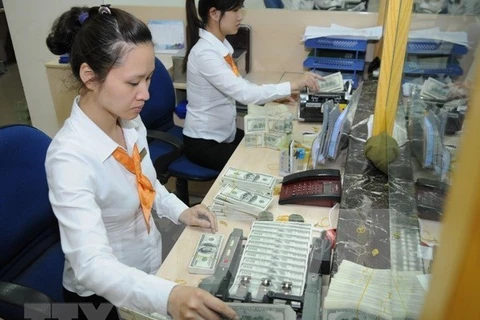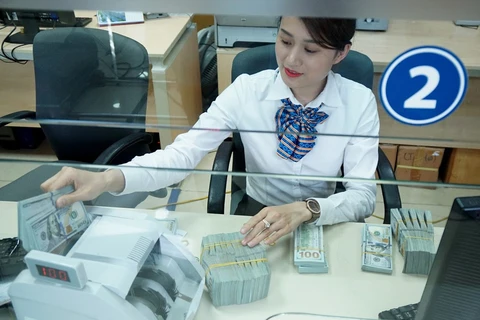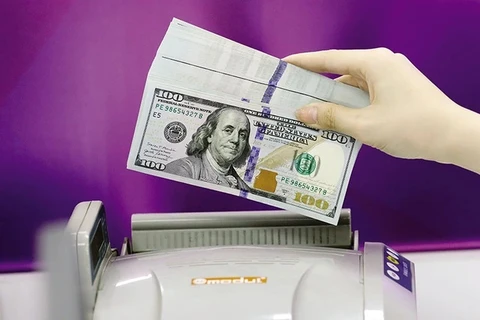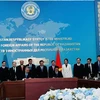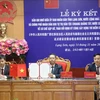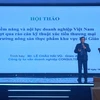 Vietnam remains one of the 10 countries receiving the most remittances in the world. (Photo: Vietnam+)
Vietnam remains one of the 10 countries receiving the most remittances in the world. (Photo: Vietnam+) Hanoi (VNA) - The growing volume of remittances sent to Vietnam not only boosts bank profits but also supports the country's policy of attracting foreign currency.
Despite the overarching effects of the global economy, Vietnam continues to rank among the top 10 countries receiving the highest remittances worldwide. Estimates suggest that remittances to Vietnam have reached nearly 16 billion USD, a significant figure given the challenging circumstances.
A report on Migration and Development by the World Bank and the Global Knowledge Partnership on Migration and Development (KNOMAD) reveals that remittances to Vietnam have consistently surpassed 10 billion USD annually since 2010.
Notably, in 2023, remittances to Vietnam hit 14-15 billion USD, ranking it among the top three countries in remittances received in the Asia-Pacific region and among the top 10 globally.
As a major economic centre of the country, Ho Chi Minh City has always been the largest recipient of remittances.
The city reported that remittances were estimated to reach nearly 9.5 billion USD in 2023, a 43.3% increase compared to the previous year.
Despite the global economic downturn, inflation, and armed conflicts impacting the economic growth of various countries, Ho Chi Minh City still managed to receive over 9.46 billion USD in remittances in 2023.
Nguyen Duc Lenh, Deputy Director of the State Bank of Vietnam's Ho Chi Minh City branch, states that the city's remittances are closely linked to the overseas Vietnamese and guest workers.
Vietnam sent 159,986 workers abroad last year, fulfilling 133.3% of the target.
On average, a worker can save between 500-700 million VND (21,739 USD-30,435 USD) after three years of working abroad. Generally, the income of workers abroad is 5 to 8 times higher than that earned domestically.
With their accumulated savings, numerous families have managed to escape poverty and build substantial homes. Returning workers have the potential to invest in business and production, significantly contributing to development. Moreover, their enhanced skills and qualifications become a valuable asset.
 With their accumulated savings, many families have risen out of poverty and built well-appointed homes. (Photo: Vietnam+)
With their accumulated savings, many families have risen out of poverty and built well-appointed homes. (Photo: Vietnam+) Mrs. Nguyen Thi Thoa, from the Ly Nhan district in Ha Nam province, said her family receives billions of VND annually from her two sons and daughter-in-law working in Japan. This financial support has enabled her family to construct a garden house worth more than 2 billion VND (86,956 USD). Furthermore, each of her children bought a prime piece of land outside the town, planning to engage in business activities when they return home.
Economic expert Associate Professor Dr. Dinh Trong Thinh, from the Finance Academy, notes that remittances to Vietnam are on the rise, representing a substantial source of capital that bolsters investment in the domestic private sector. The funds sent home by overseas Vietnamese, earmarked for family expenses, construction, and purchasing homes, have significantly contributed to sustaining the livelihoods of numerous families and bolstering social security within the country.
While remittances undoubtedly serve as a "golden" resource for socioeconomic development, they also pose a risk of being channeled into speculative and high-risk sectors. To harness the full potential of remittances, experts argue that the government should implement policies aimed at maintaining macroeconomic stability, controlling inflation, and fostering a positive shift in the investment climate.
Experts specifically suggest that to effectively utilize remittances, there should be an increase in policies aimed at steering these funds towards productive sectors and viable investment opportunities. This could be achieved by cultivating a conducive investment climate and enhancing markets such as corporate bonds and efficient securities, thereby making them more attractive for investment./.

